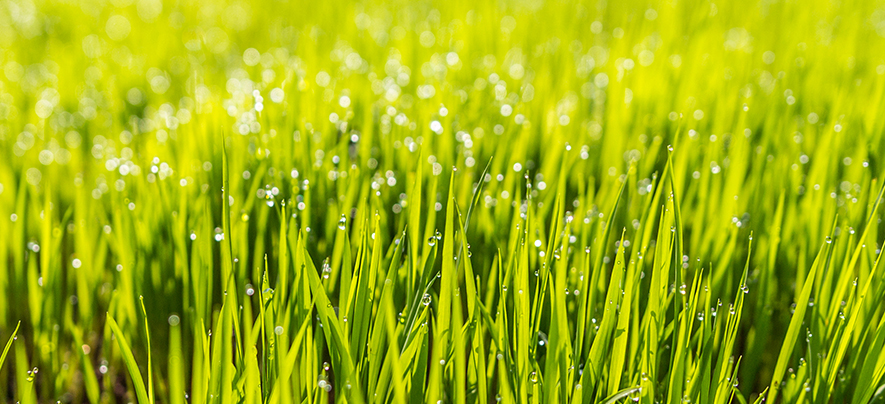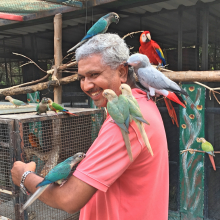The future of cattle feeding: Hydroponic fodder

Agriculture
423 week ago — 5 min read
Day by day, people are finding it more challenging to find enough fodder for the cattle they own. In winter and summer especially it is a nightmare. The cost of grass (both green & dry) is very high & will continue to rise. There will never be enough available. This forces the cattle owners to either find an alternative way to feed cattle or stop this business itself.
What are the alternatives?
There are a few different ways to grow the fodder ourselves. Each one has its own advantages & disadvantages.
The first option could be to grow paddy, wheat, maize or any other grains on large agricultural lands & use the grass to feed the cattle. This is actually a good idea whereby we produce grains & cattle also get fodder. But, not everyone will have that much land. Also, the cultivation & harvesting is seasonal with a lot of dependency on water availability and rain etc. We may have to use lot of fertilisers and pesticides during the cultivation. So the grass that is grown may not be good for the cattle. Due to these reasons, not every one can afford or is willing to do this.
The second option could be to grow any variety of hybrid grass on small land & water the plot regularly. Everyday, we can cut 1/10th of the area, feed that to the cattle & allow it to grow again for 10 days. This is also a good method & we get the fodder almost every day. For this, we need enough land & water.
So it will be better if we can find any advanced way of growing fodder which can get us fodder for 365 days a year. Hydroponic technique is one such way.
What is the hydroponic technique?
As the name says (hydro means water) this is a technique where, by using only water, we grow fodder. This is also called as soil-less cultivation. Here, water is supplied at regular intervals to grow the fodder.
Simple hydroponic fodder machine
There are sophisticated hydroponic machines available in which the light, temperature, humidity etc. are controlled & the system is fully automated with very minimal human intervention. But these are very very costly & not everyone can buy or set up these. For this reason, I would like to discuss a fairly simple machine which most cattle owners can set up which is semi-automatic.
The main components for this are
- Motor (capacity depends on the capacity of the hydroponic system). 1/2 HP for 50 Kg System
- Frame built using strong PVC pipes & other components
- Food Grade Trays (2.5’ X 1.5’ Tray 35 numbers for 50 Kg System)
- Fogger/Micro Sprinklers (70 numbers) & the feeding pipe
- Green House Net - 50% Shade
- Timer
The strong PCV pipes are cut into pieces of different sizes & joined.
A motor is used to feed water to the system. The motor is fed through a timer which turns the motor on at fixed intervals & turns it off after fixed time. The on & off duration depends on the seed we used for fodder (For Jowar on time is 3 minutes & off time is 3 hours. That means, the motor turns on for just 3 minutes once in 3 hours). It will be better to have a small water tank from which the motor pumps the water.
It takes 9 days for the seed to grow to a stage when it can be fed to the cattle. The day wise cycle is as follows.
Day 1: Wash the seeds properly & soak in water for 24 hours (Say 5K g of seeds for 50 Kg Machine).
Day 2: Remove the water completely & keep the seed in a gunny bag & put some weight on it.
Day 3: The seeds will start sprouting. Distribute these sprouting seeds into 5 trays equally & put at the bottom of the machine.
Day 4 - Day 9: Move the trays upwards one step per day. This makes sure that enough light is provided for these plants.
These steps need to be done every day & the cycle should be continued. By the end of 9th day the fodder will be fully grown & ready to feed the cattle.
Conclusion
We need to adopt advanced techniques like hydroponics, drip irrigation, vertical farming in agriculture. If we do not, then we may reach a day when agricultural land may not be sufficient to grow food for all of us & we may have to import food from outside. I don’t want to see India in that condition. So let us all try & adopt newer & advanced techniques to grow more in less space, utilising less resources and also making sure that we don’t spoil the environment in this race.
To explore business opportunities, link with me by clicking on the 'Invite' button on my eBiz Card.
Posted by
Shashank M GHave over 20 years of IT experience in various companies and worked in different positions. Now serving as a C. T. O in Samartha Infosolutions Pvt Ltd and as C. E. O in...
Network with SMEs mentioned in this article
View Shashank 's profile
Other articles written by Shashank M G
How I reduced my office electricity bill
452 week ago
Importance of vehicle tracking solutions
456 week ago
Most read this week












Comments (1)
Share this content
Please login or Register to join the discussion